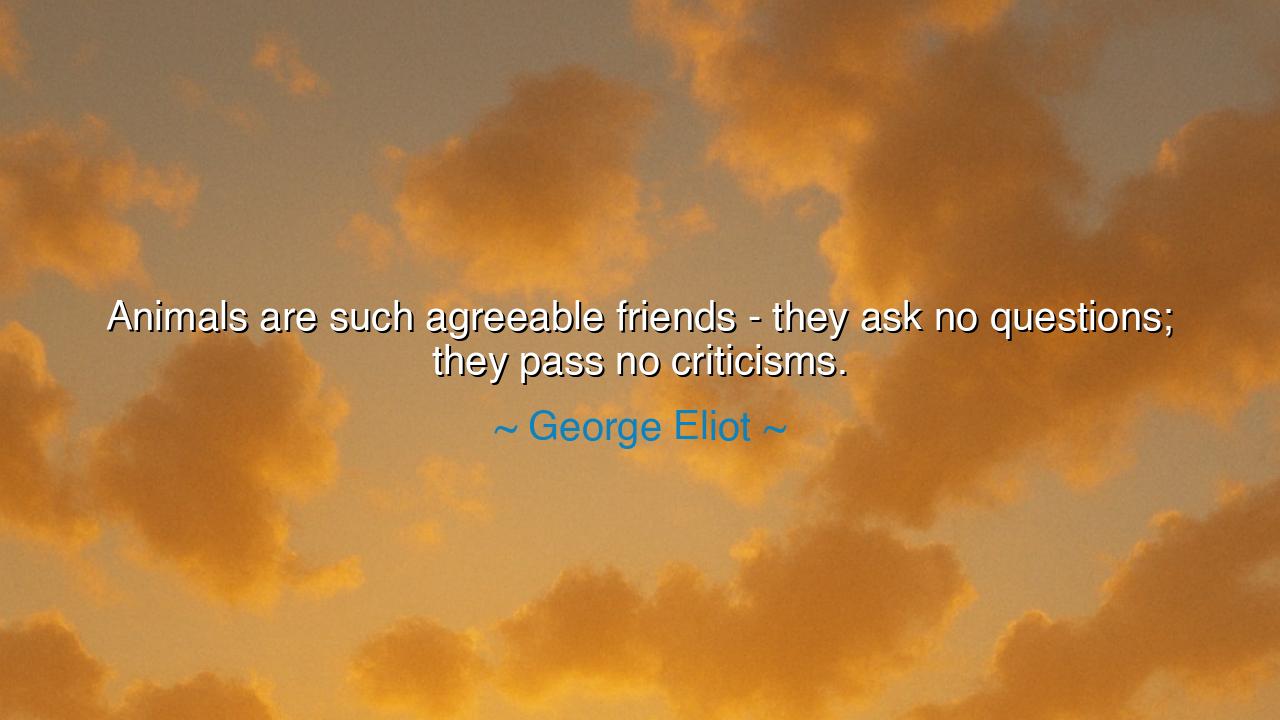
Animals are such agreeable friends - they ask no questions; they






George Eliot, the pen name of Mary Ann Evans, once wrote with quiet tenderness: “Animals are such agreeable friends—they ask no questions; they pass no criticisms.” In this gentle truth lies both a celebration and a rebuke. For Eliot, who lived in an age where human society was often harsh, judgmental, and bound by rigid expectations, the animal stood as a mirror to a simpler and purer form of companionship. Unlike men, who often love conditionally, weigh worth with suspicion, or pierce hearts with judgment, animals offer presence without interrogation and loyalty without reproach.
The origin of this thought flows directly from Eliot’s own life. As a woman of profound intellect who chose to live outside the conventions of Victorian marriage, she often endured whispers, condemnation, and ostracism. Yet in her private journals and her fiction, she turned often to the natural world for solace. In her words about animals, one hears not just observation but relief—the comfort of companionship untainted by human pride or cruelty. For in the gaze of the dog or the purring rest of a cat, she found a friendship that did not demand explanations for her choices or cast shadows of disapproval over her existence.
To say that animals ask no questions is to recognize their gift of acceptance. They do not demand reasons for our failures, nor probe the hidden wounds of our souls. They lie beside us in silence, and that silence is healing. A man may stumble in the eyes of the world, may lose honor, wealth, or reputation, but in the eyes of his dog he remains beloved. In this, Eliot reminds us of the divine nature of unconditional companionship, a gift too often absent in the dealings of men with one another.
And to say that animals pass no criticisms is to highlight their freedom from judgment. They do not mock our frailties, nor measure us against impossible standards. They love without the scales of merit, without weighing the balance of our sins. Consider the story of Hachikō, the faithful Akita in Japan, who returned each day for years to wait for his master who would never return. No criticism, no questions—only loyalty. In such stories we see why Eliot called animals agreeable friends: they embody the very qualities that humans so often fail to live by.
History itself shows how animals, through their silence and loyalty, have comforted even the mighty. Frederick the Great of Prussia, when surrounded by betrayal and politics, turned not to courtiers but to his greyhounds for solace. In their presence he found the peace denied him by men, for dogs did not scheme or betray—they simply loved. Their companionship was pure, stripped of the masks and ambitions that so often poisoned human friendship.
The lesson is clear: if animals are agreeable because they ask no questions and pass no criticisms, then we, who are capable of higher thought, must learn from them. Let us practice companionship without interrogation, friendship without constant judgment. Too often we approach others with suspicion, with demands, with hidden measurements of worth. Yet true love, whether between man and beast or between man and man, is unconditional, unburdened by endless questioning and criticism.
Practically, this means cultivating silence and acceptance in our relationships. Listen more, demand less. Accept the presence of others without always probing their motives or exposing their wounds. Learn to love as the dog loves, to rest beside a friend as the cat rests, to offer warmth without condition. In this way, we not only honor the wisdom of animals but elevate our own humanity.
So let Eliot’s words echo through the ages: “Animals are such agreeable friends—they ask no questions; they pass no criticisms.” Take them not only as praise for beasts, but as a challenge to ourselves. For if animals, who cannot reason, love so well, then surely we, who can reason, should learn to love better. In their silent loyalty lies a rebuke to our pride—and an invitation to live more gently, more faithfully, and more truly with one another.






AAdministratorAdministrator
Welcome, honored guests. Please leave a comment, we will respond soon